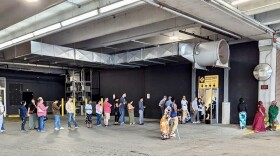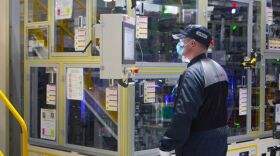This month state legislators and officials from around the country descended on Louisville for the National Conference of State Legislatures. But the gathering also attracts foreign officials, interested in making more inroads and investments in states like Kentucky.
European Union ambassador Jovita Neliupšienė, who previously served as the vice minister of foreign affairs of Lithuania, came to the conference this year, meeting with people like Gov. Andy Beshear and Louisville Mayor Craig Greenberg to discuss the EU’s role in Kentucky’s economy and how to further the EU's sustainability goals.
What brought you to Louisville this week?
Neliupšienė: This week is a big week here in Louisville, because we have the [National Conference of State Legislatures] meeting, and there are more than 4,000 people discussing how to promote sub-state level initiatives, how to work together is extremely important to get our message across, because the European Union and the U.S. actually are the biggest trading partners. We are the biggest investors to each other.
People often think of ambassadors as acting on a federal level. They don't really think about ambassadors coming to states and working with state legislators, right? That's what this conference is all about. So how does your work really translate on the state level? What do you talk about with state officials?
The European Union and the U.S. trade like $1.6 trillion a year, which is a lot, but for example, let's take Kentucky. Our trade with Kentucky in goods is $11 billion and as of last year, we had more than $38 billion investments of the European Union in the state of Kentucky. So it's huge numbers. I had an opportunity actually to visit one of the French investment companies Faurecia yesterday. Only this not-big plant actually employs more than 500 people. What can we do together more in order to encourage even more [investment]?
The EU obviously has different expectations of EU headquartered companies around sustainability. How does that play out when EU companies, say, do manufacturing in a state like Kentucky?
If they are international companies, they definitely want to trade on both sides of the Atlantic. So they would follow and implement the rules which are on both sides. In order to track down, for example, what kind of products were used in order to produce some end product, we are about to have so-called “digital sustainability” power, where you can actually scan a code, and you can see where the original materials come from, where in the supply chain, and so on.
There's such a regulation in the EU, but there is none of this kind of regulation in the U.S. But the company which we visited yesterday, Faurecia, is actually already in the process to implement because they say that, ‘Our customers want to know where the products come from.’
Obviously this conference is a chance to learn and to make relationships, but it's also a chance to ask for things' it's a chance to lobby for different policies. Are there any specific policies that you're hoping Kentucky will consider?
For the European Union, a very dear question is sustainability and efforts to promote energy efficiency, green technologies, renewable energy. When you look at what is happening around us, you see the huge ups and downs of the temperature. You see that, in one week, you can have a drought and a flood. I do believe that there is a problem, and that problem is globally recognized. And then the question is, how do you go about it?
It could be that the EU sets the highest standards, and we do, actually. We want to be carbon neutral and green by 2050. But you would not reach those goals globally, and you would not change the situation, if it will be only us.
State government and politics reporting is supported in part by the Corporation for Public Broadcasting.






